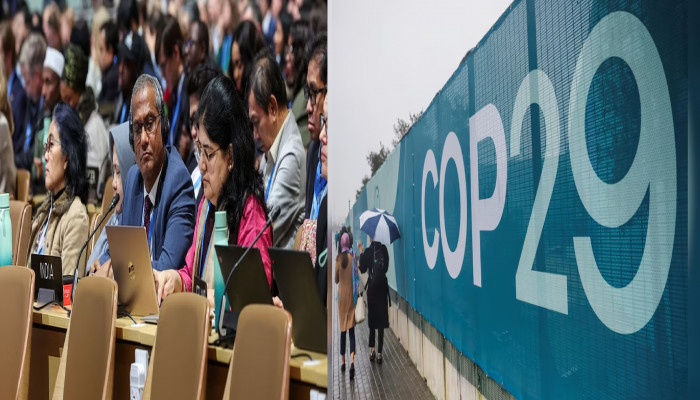'Too little, too distant': India snubs $300 billion climate finance offer at COP29
- In Reports
- 04:01 PM, Nov 25, 2024
- Myind Staff
On Sunday, India strongly rejected the $300 billion climate finance package for developing countries, calling it insufficient. India said that the COP29 presidency and the UN climate change office pushed the deal through without giving it a chance to express its concerns.
Adviser Chandni Raina of the Department of Economic Affairs made a forceful remark on behalf of India during the closing plenary of the UN climate summit here, calling the adoption process "unfair" and "stage-managed" and saying it showed the alarming lack of trust in the UN system. A new climate funding plan of a meagre $300 billion per year by 2035 was accepted by the UN climate summit, replacing the 2009 pledge of $100 billion.
The $300 billion amount is much lower than the $1.3 trillion that the Global South has been asking for over the past three years of climate change discussions. India also stated that its request to speak before the climate finance package was approved but overlooked. "We had informed the presidency and the secretariat that we wanted to make a statement before any decision on the adoption. However, and this is for everyone to see, this has been stage-managed, and we are extremely disappointed with this incident," Raina said.
"We have seen what you have done. However, we would want to say that gavelling and trying to ignore parties from speaking does not behove of the UNFCCC (United Nations Framework Convention on Climate Change) system, and we would want you to hear us and also hear our objections to this adoption. We absolutely object to this," she said while receiving a round of applause from a room full of diplomats, civil society members, and journalists. Meaningful action against climate change, one of humanity's biggest existential threats, can only be fuelled by trust and cooperation, according to Raina. "It's a fact that both (trust and collaboration) have not worked today and we are deeply hurt by the actions of the presidency and the (UNFCCC) Secretariat," she said.
India stated that it does not accept the new climate finance package in its current shape and that it is "too little and too distant" with an annual budget of only $300 billion by 2035. Developed countries, which have caused most of the greenhouse gas emissions leading to climate change, should help developing and low-income countries by providing financial support, technology, and resources to assist them in dealing with the effects of a warming planet. They promised in 2009 to contribute $100 billion annually by 2020. Only in 2020, however, was this commitment fulfilled, with loans accounting for around 70% of the total amount. “$ 300 billion does not meet the needs and priorities of developing countries. It is incompatible with the principle of CBDR (Common but Differentiated Responsibilities) and equity, regardless of the battle with the impact of climate change,” Raina said.
Nigeria said the $300 billion climate finance deal was a "joke" and backed India. India also received assistance from Malawi and Bolivia. Raina expressed that the outcome clearly shows that developed countries are unwilling to fulfil their responsibilities. She pointed out that developing countries are the most affected by climate change and are being forced to shift to low-carbon pathways, even if it harms their growth. She also mentioned that developed countries are imposing unilateral measures, like the Carbon Border Adjustment Mechanism, which makes the transition harder for developing nations.
Raina said the proposed outcome will make it even more difficult for developing countries to adapt to climate change and will negatively impact their climate goals and economic growth. The deal, which was reached after lengthy and exhausting negotiations, stated that countries would raise a total of $300 billion per year by 2035 from various sources, both public and private, as well as bilateral and multilateral, including alternative sources. The letter mentions the $1.3 trillion amount, but it urges "all actors," both public and private, to "cooperate" in order to reach this amount by 2035. It does not hold industrialised nations exclusively accountable.







Comments